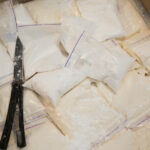The Law, Defences and Penalties for Large Commercial Drug Supply in NSW

A former ABC news presenter was refused bail in Downing Centre Local Court on Thursday, 8 December 2022 after being charged with a string of drug offences arising from raids on two Sydney Hotels.
52-year old Ashley Hall from Burwood in Sydney’s inner west presented on some of the national broadcaster’s most popular radio shows, including AM, PM and World today.
According to police, prohibited drugs with a street value $600,000 were seized after raids pursuant to warrants of rooms in hotels on Wentworth and Bond Streets in the Sydney CBD on Wednesday, 7 December 2022.
The drugs allegedly comprised 500 MDMA tablets, 100g of cocaine, 3.2kg of 1,4-butanediol, 700g of methylamphetamine and more than a 1kg of cannabis.
Police say they also seized more than $70,000 in cash.
Mr Hall was arrested and taken to Surry Hills police station, where he was charged with 23 offences, being:
- Two counts of supplying a large commercial quantity of prohibited drug,
- Six counts of supplying a commercial quantity of prohibited drug,
- Eight counts of supplying an indictable prohibited drug,
- Three counts of supplying a small quantity of prohibited drug,
- Two counts of possessing a prohibited drug,
- One count of supplying a prohibited drug on an ongoing basis, and
- Knowingly deal with the proceeds of crime (in relation to the $70,000).
It is alleged Mr Hall was using the hotel rooms as a base from which the drugs were sold.
He was refused bail at the police station and did not make an application for bail in the Downing Centre Local Court.
He was therefore formally refused bail and has been remanded in custody.
Police were ordered to serve the brief of evidence and the matter was adjourned until February 2023.
The offence of supplying a prohibited drug in New South Wales
Supplying a prohibited drug is an offence under section 25 of the Drug Misuse and Trafficking Act 1985 (NSW).
To establish the offence, the prosecution must prove beyond reasonable doubt that:
- You supplied, or knowingly took part in the supply of, a substance,
- The substance was a prohibited drug, and
- You knew, or believed at the time, that the substance was a prohibited drug.
To ‘supply’ means:
- To sell or distribute,
- To agree or offer to supply,
- To keep or possess for supply,
- To send, forward, deliver or receive for supply, or
- To authorise, direct, cause, suffer, permit or attempt any of the above.
To ‘knowingly take part in supply’ means:
- To take or participate in any step of the supply process, or causing any such step to be taken,
- To provide or arrange finance for any step in the supply process, or
- To provide the premises for any step in the supply process, or suffer or permit any such step to be taken in a premises for which the person is the owner, lessee, occupier or manager.
Drug supply penalties in New South Wales
The maximum penalties that apply to drug supply charges depend on:
- Drug type,
- Drug quantity, and
- Whether the case is dealt with in the Local Court, or a higher court such as the District or Supreme court.
The relevant quantity for offences under NSW state law is the ‘admixture’, which is the entire quantity of the substance which contains the prohibited drug, not just the pure quantity of the drug within that substance.
The drug types and quantities under the Drug Misuse and Trafficking Act 1985 are as follows:
Drug Type/Quantity Categories
| Drug Type | Small Quantity | Indictable Quantity | Commercial Quantity | Large Commercial Quantity |
| Ecstacy (MDMA) | 0.25grams | 1.25grams | 125grams | 500grams |
| Cocaine | 1gram | 5grams | 250grams | 1kg |
| Amphetamines | 1gram | 5grams | 250grams | 1kg |
| Heroin | 1gram | 5grams | 250grams | 1kg |
| Cannabis | 30 grams | 1kg | 25kg | 100kg |
The maximum penalties are:
| Quantity Category | When Dealt with in Local Court | When Dealt with In District Court |
| Less than Small Quantity | 2 years prison and/or $5,500 fine | 15 years prison and/or $220,000 fine |
| At Least Small Quantity but Less Than Indictable Quantity | 2 years prison and/or $11,000 fine | 15 years prison and/or $220,000 fine |
| At Least Indictable Quantity but Less Than Commercial Quantity | 2 years prison and/or $11,000 fine | 15 years prison and/or $220,000 fine |
| At Least Commercial Quantity but Less Than Large Commercial Quantity | Not Applicable | 20 years prison and/or $385,000 fine |
| At Least Large Commercial Quantity | Not Applicable | Life imprisonment and/or $550,000 fine |
Deemed drug supply
Section 29 of the Act enables a person to be found guilty of drug supply if they are found to be in possession of at least a ‘trafficable’ quantity of prohibited drugs, even if there is no direct evidence they actually took part in a drug supply.
The provision is commonly known as ‘deemed drug supply’ and is often used in circumstances where the police do not have evidence other than the drugs themselves.
Where a person is charged with deemed drug supply, he or she then bears the onus of proving – ‘on the balance of probabilities’ (ie more than a 50% chance) – that the drugs were for purposes other than supply eg for personal use only.
Examples of ‘traffickable quantities’ of drugs include:
- 75 grams of MDMA (or ‘ecstasy),
- 3 grams of amphetamines, cocaine or heroin, and
- 300 grams of cannabis.
Requirements of proof and propriety, and legal defences
It is important to be aware that, to establish the of drug supply, the prosecution must overcome a number of potential hurdles including, where relevant:
- Establishing that the search was legal,
- Establishing the identity of the person or persons engaged in the alleged conduct,
- Establishing the alleged conduct fell within the definition of a supply,
- Establishing the nature and quantity of substance,
- Proving ‘exclusive possession’ where this is in dispute (‘the Filipetti defence’),
- Disproving any suggestion that the drugs were being temporarily held for another (‘the Carey defence’), and
- Disproving any general legal defences that may be available, such as duress and necessity.
If any of these are lacking, the defendant is entitled to an acquittal.
Exclusive possession
The case of R v Filippetti (1978) 13 A Crim R 335 made clear that, in order to establish the offence of drug possession or supply, the prosecution must prove beyond a reasonable doubt that the defendant had ‘exclusive possession’ of the drugs in question.
This can be difficult for the prosecution to do in circumstances where the drugs were located in a common area of a home – such as in the lounge room, kitchen or bathroom – where more than one person was living at the premises, or where drugs are found in back seat, glove compartment or boot of a car which has been recently occupied by more than one person.
Temporarily holding drugs for owner
The case of R v Carey (1990) 20 NSWLR 292 established that a person cannot be found guilty of drug supply in circumstances where he or she temporarily held the drugs for the owner, intending to return them.
The person may, instead, be found guilty of drug possession; which is an offence carrying a maximum penalty of two years in prison.
Illegal searches
Section 21 (personal searches) and section 36 (vehicle searches) of the Law Enforcement (Powers and Responsibilities) Act 2001 prohibits police from conducting a warrantless search unless they have a suspicion “on reasonable grounds” that there is something stolen or otherwise unlawfully obtained, or used or intended to be used in connection with a relevant offence, or a dangerous article that is being or was used in or in connection with a relevant offence, or a prohibited drug or plant.
The sections do not elaborate on the meaning of reasonable suspicion, but the case of R v Rondo (2001) 126 A Crim R 562 set down that:
(a) A reasonable suspicion involves less than a reasonable belief but more than a possibility, that the drugs were present at the particular time,
(b) Reasonable suspicion is not arbitrary. Some factual basis for the suspicion must be shown, and
(c) The source of the officer’s information and its content must be assessed in light of all surrounding circumstances.
Where there is no such ‘reasonable suspicion’, a search is considered to be illegal and any evidence derived as a result – eg of drugs found – is subject to being excluded under the provisions of section 138 of the Evidence Act 1995 (NSW).
That section provides that illegally or improperly obtained evidence must be excluded “unless the desirability of admitting the evidence outweighs the undesirability of admitting evidence that has been obtained in the way in which the evidence was obtained”.
Matters the court considers when determining whether to exclude the evidence include:
- the value and importance of the evidence,
- the seriousness of the offence, and
- the gravity of the impropriety or contravention, including whether it was deliberate or reckless.
Given the current state of the law, there is an argument that situations which may not amount to a ‘reasonable suspicion’ include:
- where there is a positive indication by a sniffer dog, in the absence of other evidence suggestive of the presence of drugs,
- where police are patrolling a known drug area and decide to search someone because they appear to be nervous,
- where a person is stopped for a Random Breath Test and appears to be nervous or agitated,
- where police decide to search someone because he or she – or someone he or she is with – has previously been convicted of drug offences, or
- any ‘random’ or ‘arbitrary’ search.
Situations which may amount to a ‘reasonable suspicion’ include:
- where police have observed what they believe to be a drug transaction,
- where police have received a report of recent drug activity including a detailed description which matches the suspect and/or vehicle to be searched,
- where a person’s actions and demeanour are highly suggestive of having drugs, eg discarding or concealing an object that appears to be drugs, or
- where a person has provide police with informed consent to a search.
General legal defences
Although all general legal defences such as self-defence, necessity and duress apply to commercial drug supply cases, the most frequently available is the latter mentioned defence – duress.
The defence applies where you engaged in the conduct:
- Due to a threat of death or serious injury to you, or to a close family member,
- There was no reasonable way for your to render the threat ineffective, and
- Your conduct was a reasonable response to the threat.
Where any evidence of a defence is raised, the prosecution must then prove beyond reasonable doubt that the defence does not apply.
If they are unable to do so, you are entitled to an acquittal.
Going to court for drug supply?
If you have been accused of drug supply, contact Sydney Criminal Lawyers anytime on (02) 9261 8881 to secure the services of exceptional criminal defence lawyers with an outstanding track record of receiving optimal results in serious drug cases.
Our experienced team has developed techniques over more than 20 years to defend and win serious and complex drug cases, and some of our notable victories include winning Australia’s largest ever heroin importation trial – where all three of our clients were found not guilty, while the remaining three co-accused, represented by other criminal law firms, were found guilty.
We have achieved bail in circumstances that appeared insurmountable, such as when our clients were allegedly caught importing 300kgs of drugs, and in several other cases where the co-accused, represented by other law firms, were refused bail.
We often win cases after clients have seen other criminal lawyers who have advised them to plead guilty, through our in-depth knowledge of the applicable laws and procedures, meticulous preparation, proactively building defence cases (rather than simply adjourning cases to await prosecution materials), and implementation of effective defence strategies.






